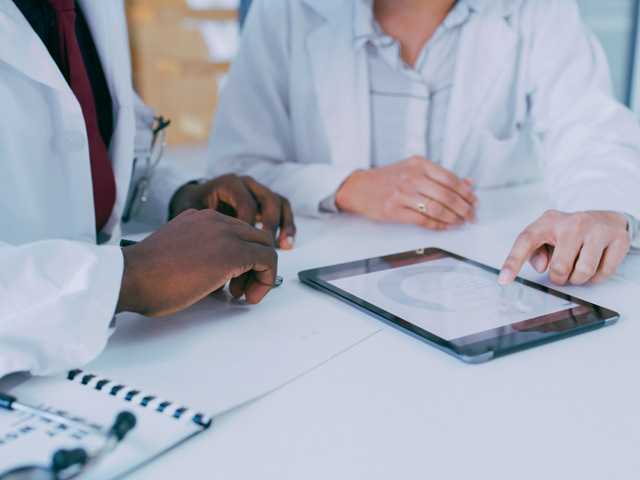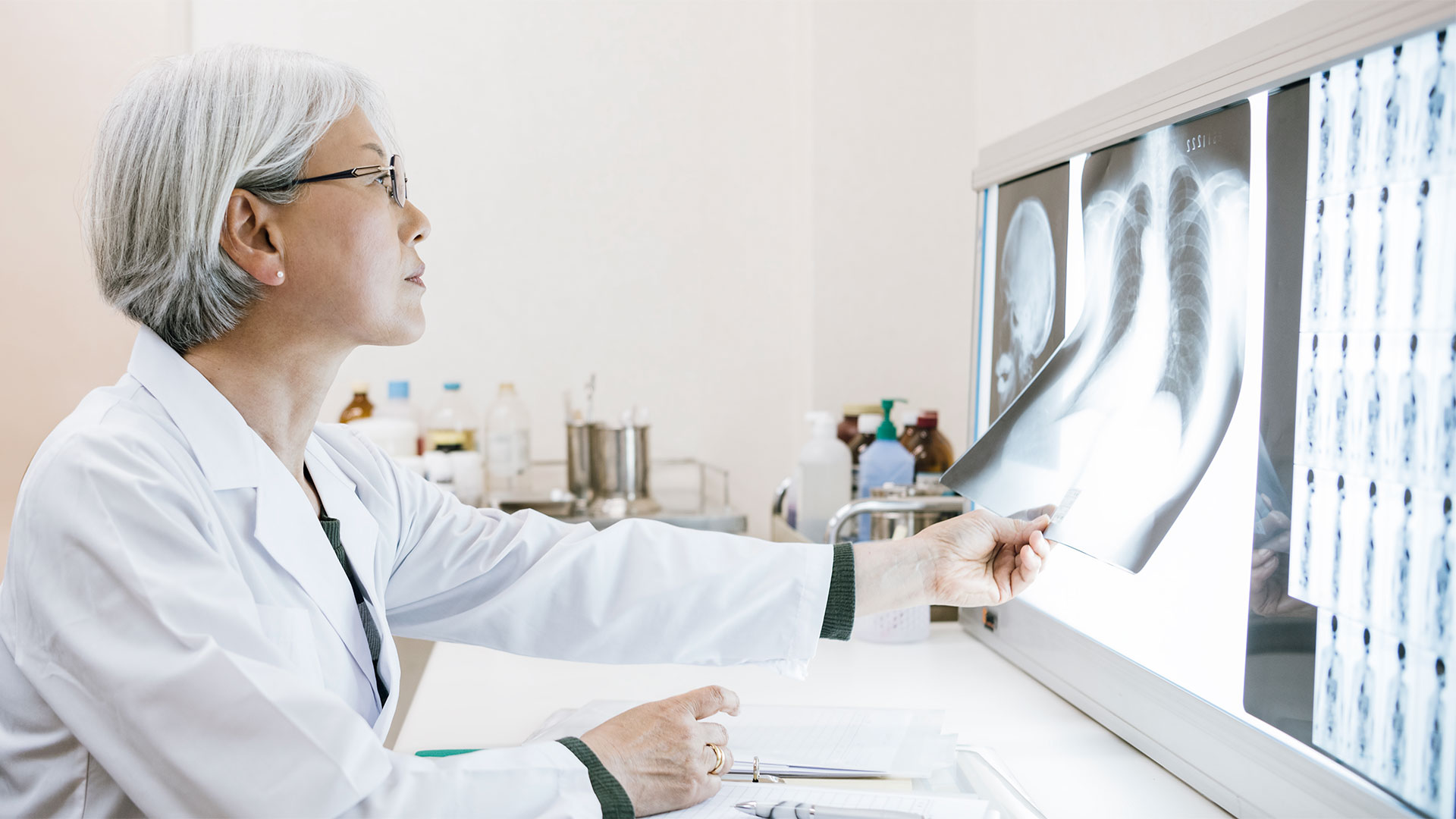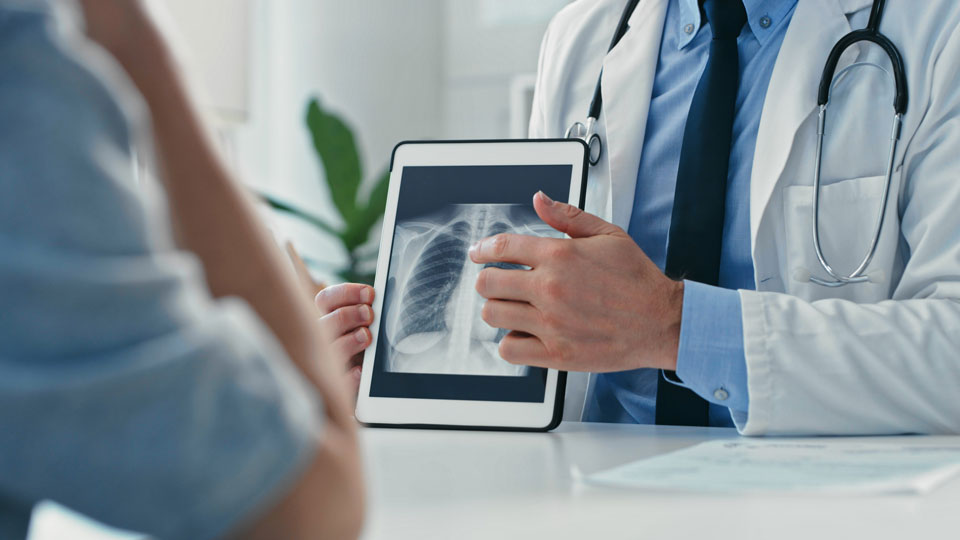
Early detection is the most powerful tool against a lung cancer diagnosis.
Lung cancer screening is a preventive health check, much like a mammogram or colonoscopy, to test for cancer before you have symptoms. It can save lives by finding cancer early, when it is easiest to treat. We are committed to making the screening process easy and pain-free.
It's important to note that lung cancer screenings are not clinical studies, but rather proactive measures aimed at early detection and improved outcomes.

Screening guidelines
Lung cancer screening can help detect cancer early, when it is the most treatable, and increases the likelihood of a positive outcome.
We recommend one-low dose CT scan each year for a minimum of three years for individuals between the ages of 50* and 77 who are at high risk for lung cancer. These risk factors include:
- Active smoker who have 20* or more pack-years of cigarette smoking history (pack-years = packs per day x years smoked)
Former smokers who quit within the past 15 years
If you don’t fall into these groups, you may not be eligible or benefit from screening. If you are eligible, you will be scheduled for a low-dose CT scan at a location near you.
*Insurance dependent based on new screening guidelines.
The benefits of screening.
Screening for lung cancer has many key benefits:
- Early detection: Lung cancer often presents with minimal or no symptoms in its early stages, making it challenging to diagnose until it has progressed. Screening allows for identification of lung cancer at an earlier stage when treatment options are more effective.
- Identification of high-risk individuals: Lung cancer screening allows for the identification of individuals who are at high risk for developing disease.
- Improves survival rates: By detecting lung cancer at an early stage, treatment interventions can be implemented promptly, leading to better survival rates and improved long-term prognosis.
- Empowerment and peace of mind: You will feel empowered by being provided the knowledge you need about your lung health. Screenings will allow you to take an active role in your healthcare decisions and seek appropriate medical intervention when necessary.
Through our screening program, we will work together to reduce the burden of lung cancer and enhance overall outcomes.
Make an Appointment Today
Early detection is the most powerful tool against a lung cancer diagnosis.
Overview of the screening process.
While everyone may have a different screening experience, regular communication with your providers is crucial throughout the screening process to address any questions or concerns you may have.
Understanding the results from your screening.
We understand that receiving the results from your screening can be an anxious and overwhelming experience. Once your test results are ready, someone from our team will call you. While you are waiting you may also receive results in your MyChart account. Please wait for us to call you and do not read your own results.
We are here to provide you with the support and knowledge you need.
What does it mean if I received a positive test result?

If your CT scan shows abnormalities that raise suspicion for lung cancer, additional tests and consultations with healthcare providers may be needed to provide a clear diagnosis. We are here to guide you through the next steps with compassion and expertise. It is important to remember that a positive result does not definitely mean you have lung cancer. It is also important to note that a positive test result could be driven by an infection called Histoplasmosis, which is caused by inhaling fungal spores in areas in the Midwest.
What does it mean if I received a negative test result?
A negative CT scan for lung cancer suggests that there are no visible signs of the disease in the scanned area. Please continue to have your regular screening each year. It is important to communicate with your provider for reassurance you may need and to discuss any ongoing symptoms or concerns you may have.

Smoking cessation services
Studies have found that smokers who quit are more likely to recover from cancer than those who continue to smoke. If you quit smoking, you can reduce your risk factors significantly.
Smoking cessation program: Our cancer center smoking cessation program allows you to meet one-on-one with a nurse practitioner who is a certified tobacco treatment specialist. Most insurance providers cover this service, but it is best to contact your insurance company directly to confirm coverage.
Free tobacco and nicotine treatment services: There are programs available for all stages of readiness and on an ongoing basis. All classes are conducted virtually through Microsoft Teams.
